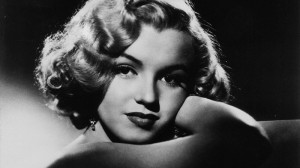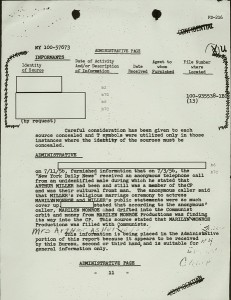FBI removes many redactions in Marilyn Monroe file

This undated photo shows actress Marilyn Monroe. In late 2012, the FBI has released a new version of files it kept on Monroe that reveal the names of some of her acquaintances who had drawn concern from government officials and members of her entourage over their suspected ties to communism. AP
LOS ANGELES — Newly re-issued and more complete FBI files on Marilyn Monroe reveal the names of some of the movie star’s acquaintances with suspected communists who drew concern from government officials and her own entourage.
But the files, which previously were heavily redacted, do not contain any new information about Monroe’s death 50 years ago.
The files recently were obtained by The Associated Press through the Freedom of Information Act. The AP had sought the removal of redactions from Monroe’s FBI files earlier this year as part of a series of stories on the 50th anniversary of Monroe’s death.
They show the extent the domestic intelligence agency was monitoring the actress for ties to communism in the years before her death in August 1962. The bureau never found any proof she was a member of the Communist Party. Monroe’s file begins in 1955 and mostly focuses on her travels and associations, searching for signs of leftist views and possible ties to communism.
One entry, which previously had been almost completely redacted, concerned intelligence that Monroe and other entertainers sought visas to visit Russia that year.
Article continues after this advertisementThey also reveal that some in Monroe’s inner circle were concerned about her association with Frederick Vanderbilt Field, who was disinherited from his wealthy family over his leftist views.
Article continues after this advertisementA trip to Mexico in 1962 to shop for furniture brought her in contact with Field, who was living in the country with his wife in self-imposed exile. Informants reported to the FBI that a “mutual infatuation” had developed between Field and Monroe, which caused concern among some in her inner circle, including her therapist, the files say.

This file copy of a document, obtained by The Associated Press through the Freedom of Information Act, from playwright Arthur Miller’s FBI file, shows an FBI report stating, that “the New York Daily News received an anonymous telephone call” on July 3, 1956. The caller, “an unidentified male,” stated that “Arthur Miller had been and still was a member of the CP (Communist Party) and was their cultural front man” and that (his wife) “Marilyn Monroe” also “had drifted into the Communist orbit.” The file revealed that Miller had been the subject of FBI surveillance for a long time. AP/FBI
Field’s autobiography mentions that he and his wife accompanied Monroe on shopping trips and meals, and he only mentions politics once in a passage on their dinnertime conversations.
“She talked mostly about herself and some of the people who had been or still were important to her,” Field wrote in “From Right to Left.” ”She told us about her strong feelings for civil rights, for black equality, as well as her admiration for what was being done in China, her anger at red-baiting and McCarthyism and her hatred of (FBI director) J. Edgar Hoover.”
Under Hoover’s watch, the FBI kept watch on the political and social lives of many celebrities, including Frank Sinatra, Charlie Chaplin and Monroe’s ex-husband Arthur Miller. The bureau has also been involved in investigations about crimes against celebrities, including threats against Elizabeth Taylor, an extortion case involving Clark Gable and more recently, trying to determine who killed rapper Notorious B.I.G.
For years, the FBI files on Monroe have intrigued investigators, biographers and those who don’t believe her death at her Los Angeles area home was a suicide.
A 1982 investigation by the Los Angeles District Attorney’s Office found no evidence of foul play after reviewing all available investigative records, but it noted that the FBI files were “heavily censored.”
That characterization intrigued the man who performed Monroe’s autopsy, Dr. Thomas Noguchi. While the investigation concluded he conducted a thorough autopsy, Noguchi has conceded that no one will likely ever know all the details of Monroe’s death. The FBI files and confidential interviews conducted with the actress’ friends that have never been made public might help, he wrote in his 1983 memoir “Coroner.”
“On the basis of my own involvement in the case, beginning with the autopsy, I would call Monroe’s suicide ‘very probable,'” Noguchi wrote. “But I also believe that until the complete FBI files are made public and the notes and interviews of the suicide panel released, controversy will continue to swirl around her death.”
The files on Monroe continue up until the months before her death and include several news stories and references to Norman Mailer’s biography of the actress, which focused on questions about whether Monroe was killed by the government.